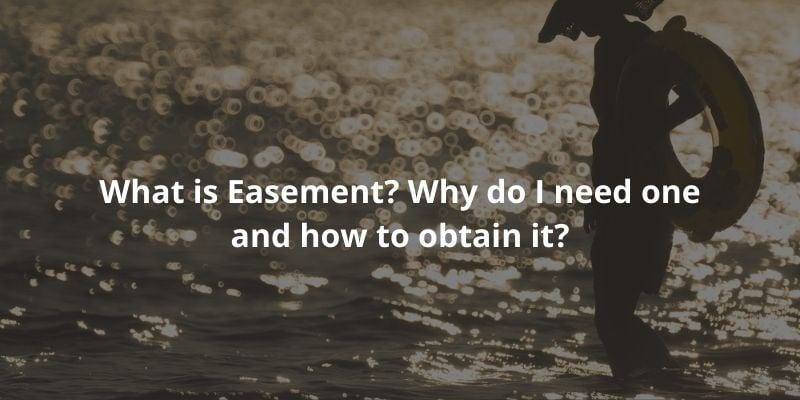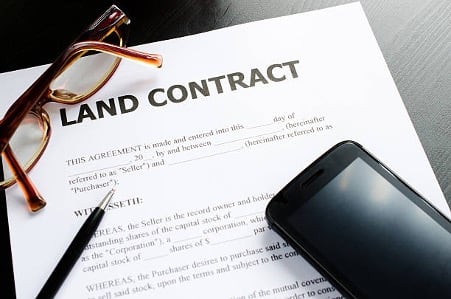Easements: What They Are, Why You Need One, and How to Obtain One
31 Jan 2023
2 Jul 2021
min read

Have you ever had a car parked on your driveway that drives you crazy? Or, if you live in a high-rise apartment, have you wondered where you and your neighbours lay your telephone or internet cables? You may find the answers in the law of easements because if you have an easement, you have the right to use or enter onto a property that you do not own.

What is Easement?
Simply put, an easement is a right to use and/or enter another person's property without possessing it. One classic example of an easement is a right of way. If you own a house and your only way of accessing the main road is walking across your neighbour’s driveway, you can do so if your neighbour gives you an easement. There are some common forms of easements. For example:
- Right of drainage;
- Right to park;
- Right to erect a sign; and
- Right of support (for buildings)
An easement can be granted or reserved. For instance, you are selling 60% of your land to someone else, and you wish to continue to walk across that part of the land to access the remaining 40% of your land. In that case, you can reserve a right of way when you sell that 60% of your land to your buyer.

What is Easement in Gross?
As discussed, an easement is a right attached to the property rather than to the person. However, there is an exception, i.e. Easement in Gross. An easement in gross can be made by either an individual or a company.The main difference between an Easement in Gross and a typical easement is that the former is a personal right that does not affect the land.
Unlike a typical easement, there does not need to be two landowners for an Easement in Gross. Therefore, Easements in Gross are often employed by utility companies. The companies usually own no neighbouring land, yet they can still obtain an easement from you so that they can lay underground cables beneath your house.
An Easement in Gross has similar effects as a licence. In the case where the landowner sells the property, the Easement in Gross Agreement will become invalid. This is because the Agreement binds the original contracting owner personally rather than all subsequent owners of the property. T
Similarly, the holder of an Easement in Gross (who enjoys the right) cannot transfer the rights under the easement to any third parties. This prevents the potential depreciation in property prices.
You should note that Easements in Gross are not available across all common law jurisdictions. For instance, it is applicable in some US states, but it does not exist in UK's land law. You should check with your local legal professionals to ascertain your home jurisdiction's position on the Easement law.
The following sections of this Article focus on easements in general, also known as Easement Appurtenant.

How do I know if there is an Easement?
Since easements can be granted in more than one way, there can be situations where you have granted or been enjoying an easement without knowing. To identify an easement, you should consider four essential characteristics. They are:
- There must be a dominant land and a servient land;
- The owners of these lands must not be the same person;
- The right must accommodate the dominant land; and
- The right must be capable of forming the subject matter of a grant.
Essentially, the first two elements mean that there must be two pieces of land or areas with different owners. The dominant landowner enjoys the easement at the expense of the servient landowner.
The third characteristic is a bit more complicated. It says that the right must be beneficial to the land rather than the current owner personally. For example, you are carrying out a massage business and wish to erect a sign outside your window, and the sign blocks your downstairs neighbour’s window. In such a case, the sign is "beneficial" to you (and your business) rather than the use of your apartment. Hence, the right is not “accommodating” the land.
The last element’s implication is that the dominant owner cannot enjoy a right that is too extensive, so to protect the servient owner’s right to use his own land. In effect, the right must be clearly defined.

What are the Advantages of Easement?
Imagine you own a landlocked cabin, where another person owns the surrounding fields. How can you get to the road? You will have to pass through the fields, so you need permission from the owner of the surrounding land. One way to do that is to get a licence, but there are certain limitations to a licence.
A licence is only a personal or contractual right, so only the parties to the contract can enforce the contract. Hence, you cannot sell your cabin with the same right of way. Your potential buyers will have to re-negotiate with the surrounding fields’ owner, though your neighbour might not grant a new licence to your buyer. Therefore, the price the buyer will be willing to pay might be lower.
Another problem with a licence is that even if you successfully obtain one, you would have to re-negotiate a new licence with the new landowner once your neighbour moves away. Similarly, you might not be able to get a licence.
Given the limitations to licences, it is often more convenient in the long term to obtain an easement. Though commercially speaking, it might be more costly to obtain an easement than a licence since it is more durable than a licence, which you can revoke when you want to. You should note that you might still be liable to pay damages for breach if there is a contract to licence.

How do I Acquire an Easement?
Easements can be expressed, implied, or presumed.
1. Expressed
To grant or reserve an easement, as it is required to deal with any other interests in land, the parties must do so by deed (similar to a contract but without consideration). If there are any further legal formalities required by law, such as registration, those must be complied with as well.
2. Implied
There are a few circumstances where an easement would be implied, including necessity, common intention and quasi-easement.
Easement by necessity
As shown in the example earlier, if you own a landlocked property and it is necessary to walk across your neighbour’s land to access the main road, there will be an implied easement. However, the threshold to necessity is relatively high. Only when there are no legal means to access would it be considered necessary to cross someone’s property. Thus, in most cases, it is unlikely that you can rely on this ground.
Easement by common intention
There can also be implied easement by common intention. Say, if you have obtained a lease to operate a restaurant on the ground floor while your landlord is living upstairs. In the event that you need to install a ventilation system through the roof to comply with the rules of your restaurant’s licence, if there is a covenant to comply with public health regulations in the lease, you can likely obtain an implied licence. Given that the terms of the lease (of compliance with regulations) cannot be performed otherwise, it can be said that both parties have intended such easement.
Quasi-easement
A peculiar implied easement arises when the landowner sells or rents out a part of his land. Suppose you owned a farmyard and you built a cottage in the centre, which you later sold to someone. You had been accessing the cottage via a certain path on your farmyard that forms an apparent track on the ground. Then, unless there is another reasonable way to access the cottage, the buyer of your cottage will automatically enjoy the easement of walking across your farmyard. This is known as quasi-easement, where all characteristics of easement were found before conveyance, except the diversity of ownership.
3. Presumed:
Easement by prescription
A presumption of easement is also known as an easement by prescription or lost modern grant. It is an irrebuttable grant for the uninterrupted use of 20 years as if there were an easement. During those 20 years, the non-owner must be using the land openly without forcing the owner to consent to the use and without the owner's permission. After those 20 years, even if the owner steps up and claims that there has never been a grant of easement, the easement still remains irrebuttable.
The main reason to prescribe an easement is to let long-exercised rights remain undisturbed. Since the owner of the land did not object to someone walking across his yard for 20 years, the law presumes that he is granting the right of way.

How does an Easement come to an end?
There are a few ways to terminate an easement.
1. By release
As it is required to deal with any other interests in land, an easement must be terminated by deed.
2. By unity of possession
Diversity of ownership is essential to easements. Therefore, if the same person eventually owns the two pieces of land in question, the easement will come to an end.
You must also note that where there is common ownership via a lease, the easement is only suspended for the term of the lease.
3. By effluxion of time
If there is an expressed expiration date for the easement (on the deed), the easement ceases to exist once it is expired. However, if the easement is granted on top of a lease, then once the lease expires, the easement will simultaneously come to an end.
Disputes over Easements
If you wish to obtain an easement, it is possible to argue in court for a right that has never been recognised as an easement before. However, it would definitely be a more challenging case to win compared to arguing for an existing right.
At the end of the day, if you are purchasing a property, you should always read through the disclosures carefully. Do not worry if you find out that there is an easement attached to the house. As long as you understand the purpose and the extent of the easement, you can ascertain the possible impacts of the easement. Even if an easement is attached to a land, it does not necessarily bring a negative experience to the homeowner.
Please note that this is just a general summary of the position under common law and does not constitute legal advice. As the laws of each jurisdiction may be different, you may want to speak to your lawyer.
Keywords:

